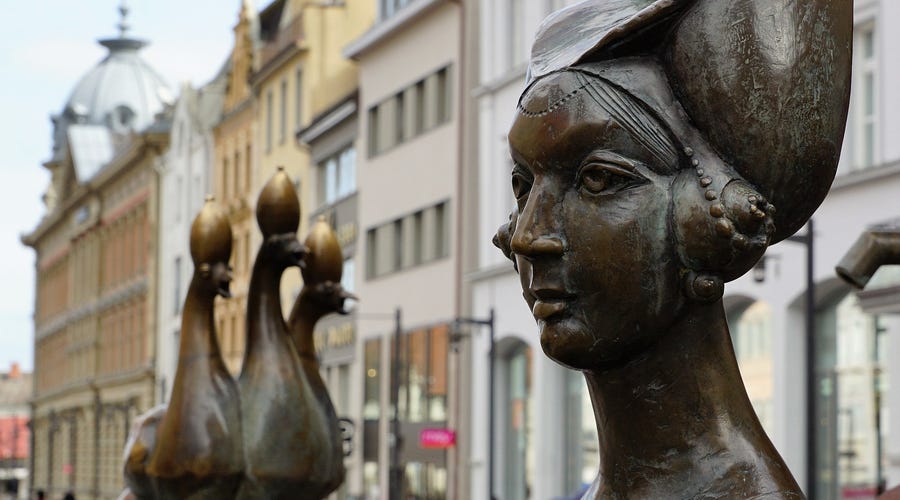
An amazing guide to German culture, traditions, customs & more
Author: Marie Schmoll
Culture and language acquisition go hand in hand. It’s just as impossible to understand a culture without learning some of the language as it is impossible to learn a language without understanding some of the culture.
The easiest way to portray a culture is always through cliches. So when you picture a German in your head, they might be wearing traditional Bavarian Lederhosen or a Dirndl, a pretzel in one hand, and a big jug of beer in the other, rushing to the Deutsche Bahn so they’ll be early for some appointment - but that’s only one tiny pixel of the whole picture.
Germany is also known as the country of poets and thinkers. Rich with art, literature, music, and technological inventions, German culture is known for its dedication to excellence, a deep respect for history, championing freedom of thought, and an enduring commitment to sustainability.
As a German language learner, understanding Germany’s history and culture will help you understand its presence and, therefore, German everyday life. So let’s dive into some fascinating facts about German culture, including Germany’s groundbreaking contributions to art, science, and philosophy, and illuminate the path toward a deeper understanding and appreciation of what makes Germany unique.

German language and communication
German language
The German language is one of the most spoken languages in the European Union, and an interesting choice if you’re looking for a language to learn. Here are some fun facts about the German language:
- German is the official language of Germany, Austria, Switzerland, Luxembourg, and Liechtenstein
- Native Speakers: Approximately 95 million worldwide
- Approximately 15 million people worldwide are learning German as a second language (including you!)
- German has 4 letters that English doesn’t have: ä, ö, ü, and ß
- German pronunciation can be difficult to get right for English speakers, especially subtle differences like the ones between “machen” and “manchen” or “Bach” and “back” can be the cause of some serious tongue twisting
- German is known for extremely long words: According to the Duden, the longest German word currently has 79 letters
Learn some language basics with our free German essentials downloadable booklet.
German dialects and regional variations
There are many German dialects and regional variations:
- High German (Hochdeutsch): The standard form used in formal contexts nationwide
- Low German (Plattdeutsch): Spoken in the northern regions, close to the Baltic Sea
- Bavarian (Bairisch): Spoken in Bavaria
- Swabian (Schwäbisch): Baden-Württemberg and parts of Bavaria
- Franconian (Fränkisch): Northern Bavaria, parts of Baden-Württemberg, and Hessen
- Saxon (Sächsisch): Saxony and parts of Saxony-Anhalt and Thuringia
- Berlin-Brandenburgish (Berlinerisch/Brandenburgisch): Berlin and the surrounding Brandenburg area
- Palatinate German (Pfälzisch): Rhineland-Palatinate and parts of the Saarland
- Low Saxon (Niedersächsisch): Lower Saxony, Schleswig-Holstein, and parts of the Netherlands
- Alemannic German (Alemannisch): Baden, parts of Bavaria, Switzerland, Alsace (France), and Liechtenstein.
- Swiss German: Spoken in Switzerland, Swiss German has its own variety of dialects
- Austrian German: Austrian German also varies between the different regions of Austria
Historical context about German culture
A country’s history will influence its beliefs and behaviors and shape the country it becomes. From its early tribal beginnings to the modern democratic country it is today, Germany underwent significant political, social, and economic transformations.
Its history begins with the Germanic tribes, which had various interactions with the Roman Empire, culminating in the famous Battle of the Teutoburg Forest in 9 AcE where they decisively defeated the Romans. This victory ensured that the Germanic tribes would stay unconquered by Rome and be free to maintain their independence.
Over the centuries, these tribes became a patchwork of kingdoms and principalities, eventually unified into a single nation-state under Prussian leadership in 1871, when the German Empire was born.
The times that followed were characterized by rapid industrialization, technological advancement, and a strong military, making Germany a major European power that played an important role in World War I.
When that war was lost, and the Treaty of Versailles imposed harsh penalties on Germany, the direct result was economic hardship, social unrest, and a sense of national humiliation. Unfortunately, these conditions were fertile ground for political extremism and allowed for the darkest chapter of German and possibly all history.
In 1933, Adolf Hitler was appointed Chancellor, marking the beginning of the National Socialist regime, leading to World War II and the Holocaust, and only ending in 1945 with the fall of the German Reich. Germany was split between the victorious powers of the United States, England, France, and Russia, but when tensions arose between the three Western countries and Russia, Germany was soon split in two, and the East, which was ruled by communist Russia, became the DDR (German Democratic Republic), separated by a wall in Berlin, and a border in the rest of the country.
Reunification happened on October 3rd, 1990, marking the beginning of Germany as it is today.
Ideally, a country will learn from past mistakes and strive for prosperity and a better future, and one thing that is very obvious among educated, young Germans is a deep suspicion of nationalist values and patriotism. Usually, you only see German flags raised during the soccer championship, and Germany is unlikely to ever have a strong military again.That way, Germany's history is reflected in many of its values.
Importance of politeness and formality
Germans are known for placing a high value on politeness and formalities in their communication, using titles and last names when talking to strangers, but don’t take this too far! If someone is introduced to you through a common friend or as a colleague, you’ll likely be using the informal “du” and not “Sie”.
In a job interview or when you’re talking to a complete stranger, you might want to err on the side of caution and use “Sie”, but the safest thing is always to copy whatever form the other person is using to address you.
Communication styles in business and social settings
Understanding and adapting to different communication styles is essential if you want to build positive relationships and have effective interactions. In Germany, communication is a mix of directness and formality. It’s not as casual as communication among Americans, but hierarchies are not nearly as important as they are in Japanese or Thai culture, for example.

Arts and literature
Overview of German literature
German literature is a treasure trove of deep thoughts and imaginative storytelling, from Kafka to Proust. The fascinating thing about the German language is how precise it is, so famous German literary works include some very special lines that just can’t be translated. These are some of the most famous German classics:

- "Faust" (Faust) by Johann Wolfgang von Goethe
- "Die Verwandlung" (The Metamorphosis) by Franz Kafka
- "Der Steppenwolf" (Steppenwolf) by Hermann Hesse
- "Im Westen nichts Neues" (All Quiet on the Western Front) by Erich Maria Remarque
- "Buddenbrooks: Verfall einer Familie" (Buddenbrooks: The Decline of a Family) by Thomas Mann
- "Die Blechtrommel" (The Tin Drum) by Günter Grass
- "Das Parfum" (Perfume: The Story of a Murderer) by Patrick Süskind
Influence of German philosophers
German philosophers also left their mark on various fields of knowledge. Their contributions reach from philosophy to literature, science, and modern social theories, shaping critical thinking and analytical frameworks worldwide.
Immanuel Kant's exploration of morality and epistemology, Arthur Schopenhauer's will and representation, and Friedrich Nietzsche's critique of morality and culture, have all challenged and expanded the boundaries of human understanding, influencing generations of thinkers.
Contemporary German literature and art scene
In literature, Germany has seen a surge of works that explore identity, memory, and the complexities of the modern world. These are some famous contemporary German authors:

- Cornelia Funke ("Tintenherz", “Inkheart”)
- Daniel Kehlmann ("Die Vermessung der Welt", “Measuring the World”)
- Juli Zeh (“Engel und Adler", “Eagles and Angels”)
- Bernhard Schlink ("Der Vorleser", “The Reader”)
Germany has also long been a hub for artistic innovation. German streets are known to be full of artworks and graffiti, and today's artists continue to push boundaries, exploring new mediums, concepts, and themes. These four contemporary German artists have made significant contributions to the global art world:
- Gerhard Richter (photo-realistic painter)
- Andreas Gursky (photographer)
- Isa Genzken (sculptor and conceptual artist)
- Neo Rauch (leading figure in the New Leipzig School of painting)
- ECB aka Hendrik Beikirch (street artist)
Expressionism and Bauhaus movements in art
Germany specifically played a central role in the development of art movements like Expressionism and the Bauhaus movement, each marking significant shifts in the art and design world.
Expressionism originated in Germany in the early 20th century as a reflection of the country's socio-political turmoil. German groups like “Die Brücke” and “Der Blaue Reiter” were instrumental in shaping the movement's focus on subjective reality, with intense colors and dynamic compositions.
The Bauhaus movement was founded by the German architect Walter Gropius in Weimar in 1919. It redefined artistic creation by merging art, craftsmanship, and tech. This approach aimed to create functional, aesthetically pleasing designs suitable for mass production.

Impact of Romanticism on German music
Another movement shaped by German players, was the Romantic movement in the 19th century, a period that set a new emphasis on emotion, individual expression, and a deep connection with nature.
German dance and music
Classical heritage of German music
When you talk about Classicism, usually five giants come to mind, and they all happen to be German (and one Austrian):
- Johann Sebastian Bach
- Ludwig van Beethoven
- Richard Wagner
- Johannes Brahms
- Wolfgang Amadeus Mozart
Modern music genres in Germany
I hope you don’t think Germans all listen to the industrial metal band Rammstein because the truth is we don’t. They’re definitely catering to Americans more than they do to Germans. Another singer that might come to mind is the Neue Deutsche Welle singer Nena, and we’re not NOT gonna dance when we hear her famous hit 99 Luftballons, but there’s so much more:

- Electron takes center stage with Kraftwerk, the robot kings of the electronic world
- Tokio Hotel, the pop-rock boy band sensation from the early 2000s
- Helene Fischer, the reigning queen of Schlager music
- Rock has its heroes in the Scorpions, who rocked the German music landscape through the 80s and beyond
- Paul Kalkbrenner is known for his blend of techno and house music
- Seeed, the Berlin-based band around singer Peter Fox, is known for their fusion of reggae, dancehall, and hip-hop, creating their unique, and very dancable sound
Traditional German dances
Speaking of dancing, there are a few dance styles that are specific to German culture. Here's a closer look at some of the more widely recognized traditional German dances:
- Polka: A lively, fast-paced dance that originated in the 19th century, known for its half-step rhythm
- Walzer: A staple in German and Austrian ballrooms, the Waltz is known as a a smooth, flowing dance with elegant turns
- Schuhplattler: A traditional Bavarian and Tyrolean dance that combines robust slaps of the dancers' shoes
- Ländler: A folk dance, slower than the waltz, with more elaborate figures
- Volkstanz: Literally "folk dance," encompasses a variety of regional dances that have been passed down from generation to generation
German cuisine
German cuisine offers a hearty and diverse palate, celebrated for its rich flavors, with an emphasis on breads, potatoes, and krauts. Check out our delicious guide on traditional German food dishes!

Regional specialties of German cuisine
Here’s a preview of some of the regional foods we’ve covered over there:
- Kartoffelsalat: The traditional German potato salad, typically dressed with vinegar and oil in the south and mayonnaise in the north
- Spätzle: Soft egg noodles or dumplings from the region of Swabia, often baked with cheese
- Schwarzwälder Kirschtorte: A famous cake from the Black Forest region, layered with chocolate sponge, whipped cream, and cherries, and flavored with “Kirschwasser” cherry brandy
Holiday and festival foods
During holidays and festivals, Germans like to eat extra special foods:
- Stollen (Christmas, Germany): A dense, sweet bread with dried fruits, nuts, and marzipan, dusted with powdered sugar, symbolizing the winter snow and enjoyed during the Christmas season
- Osterzopf (Easter, Germany and Austria): A braided bread, sprinkled with almonds and sugar crystals
- Krapfen (Carnival/Fasching, Germany and Austria): Deep-fried doughnuts filled with jam or cream and dusted with powdered sugar
- Zwetschgenkuchen (Harvest season in late summer/early fall, Germany): Cake made from shortcrust pastry, topped with fresh plums to symbolize the harvest season
Importance of bread, sausages, and beer in German cuisine
In German cuisine, bread, sausages, and beer are not just food items. They’re cultural icons!
- Bread is often eaten for breakfast and dinner. In fact, the German word for dinner literally translates to “evening-bread” (Abendbrot). With over 600 different types of German bread, including rye breads and fluffy wheat rolls, you’ll never run out of options though.
- There are multiple regional varieties of sausage, or "Wurst," from Bavaria's Weißwurst, and Thuringia's Rostbratwurst, to Berlin countless options of vegan sausages made from Tofu, Saitan or veggies.
- Germany's beer culture is one of the oldest in the world, thanks in part to the Reinheitsgebot (Beer Purity Law) of 1516. There’s Bavaria's Hefeweizen, Cologne's Kölsch, and the Flensburger Pilsener, but almost every city seems to have its own and is usually very proud of it!
German customs and traditions

Family values and social etiquette in German culture
German family values include respect, responsibility, and a strong sense of community. Social etiquette usually includes punctuality, direct communication, and a high regard for privacy. Upholding these shared values is crucial to building relationships and social cohesion.
Family
The family plays an important role in every society, and German culture is no exception. It’s the cornerstone of social structure.
Families are generally on the smaller side, and the nuclear family is especially important, while the extended family usually plays a secondary role.
Punctuality and efficiency
It’s true. Even if we don’t regard ourselves as overly punctual, once Germans go to a different country, it often becomes painfully clear just how casually most other cultures treat appointments and time agreements compared to us. Punctuality is just seen as a sign of respect and reliability in Germany, because efficiency is highly valued, in both personal and professional contexts. This reflects a broader cultural appreciation for order and planning.
Direct communication
Directness and honesty in communication are prized in German culture, with a preference for straightforwardness, aiming for clarity and mutual understanding. So watch out, most Germans are not afraid of confrontation!
German clothing conventions
In German culture, clothing doesn’t play as big a role as it does in fashionable Italy or more conservative countries that emphasize modesty. Instead, clothes are meant to be functional and comfortable. Of course, many Germans do value fashion and want to express themselves through their style, but there’s a reason why Germans are often portrayed as wearing Birkenstocks with socks. It’s just so easy, and Germans like their clothes to be the way they like most things to be: straightforward and practical.
German clothing conventions
German culture and customs are centered around outdoor life and physical activities, like hiking, cycling, and other sports, regardless of the season. In Germany, fewer people drive cars, especially in the big cities. Instead, they rely on public transport, walking, or biking to work.
Celebrations and traditions
Celebrations and traditions are integral to German life, as a way to honor the past, strengthen community bonds, and mark life's milestones, from Christmas and Oktoberfest to personal celebrations like birthdays.
These are the most important German holidays and festivals:
- Neujahr (New Year's Day): January 1st
- Karneval/Fasching (Carnival): A festive season celebrated with parades, costumes, and parties, especially in the Rhineland and southern Germany
- Ostern (Easter): Traditions include Easter egg hunts and the Easter Bunny
- Tag der Deutschen Einheit (German Unity Day): October 3rd, commemorating the anniversary of German reunification in 1990
- Heiligabend and Weihnachten (Holy Eve and Christmas): December 24th, 25th and 26th
- Oktoberfest: The world's largest Volksfest held in Munich, Bavaria
- Silvester (New Year's Eve): December 31st, celebrated with fireworks, parties, and the tradition of Bleigießen (lead pouring) to predict the future.
For a more detailed tour of German culture and traditions throughout the year, check out our festive guide to the seasons!
Work-life balance
Germans place a high emphasis on work-life balance, often valuing the importance of leisure and family time over professional commitments, which is reflected in their strong support for vacation time and parental leave policies.
German work culture
In Germany, the principle of work-life balance is facilitated through well-defined working hours, generous vacation policies, and a statutory framework that supports a long parental leave for both parents.
German professionals are expected to display a high degree of punctuality, competence, precision, and attention to detail, but there’s a clear line between work and personal life. Germans like to maintain focus and productivity during working hours and then roll down their sleeves and enjoy a Feierabendbierchen (the little post-work beer) as soon as the clock strikes 5.
Germany has some fascinating work policies! Find out more in our Guide to German business culture, etiquette & vocab.
German society and the German lifestyle
Overall, the German lifestyle combines traditional values of efficiency, punctuality, privacy, and an appreciation for orderliness in daily life, with more progressive values like sustainability, environmental consciousness, and social equality.
Family is central, with an emphasis on spending quality time together, particularly during the holidays. Daily life is structured, with a clear separation between work and leisure and social interactions are usually planned ahead and communicated beforehand, reflecting a broader cultural appreciation for predictability and plannability.
There’s a strong appreciation for outdoor sports, science, literature and the arts. Generally, education and intellectual pursuits are highly valued, with a strong focus on fostering independence and critical thinking from a young age. Of course, you also need to make a living in Germany, but there’s less pressure to have your own house, settle down, and collect lots of material things.
Instead, young Germans often decide to travel the world, engage in volunteer projects abroad, or study whatever they’re interested in, and figure out how to make money with it later. Of course, these options are only possible because Germany is a privileged nation, with lots of financial incentives and a social safety net that enable citizens to explore and grow beyond traditional career paths.
After high school, between their Bachelor’s and Master’s and even as part of the workforce, more and more Germans opt for gap years and sabbaticals in order to travel the world, engage in volunteer projects, or learn new things, including languages.
If you’re feeling inspired to go on a German language learning journey just because it’s something you’d like to explore, make sure you prepare yourself with our helpful German language guide!


